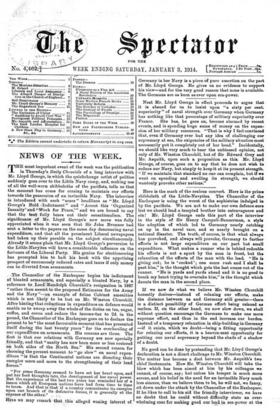The Chancellor of the Exchequer begins his indictment of bloated
armaments, and especially a bloated Navy, by a reference to Lord 'Randolph Churehilre resignation in 1887 "rather than assent to the proposed Estimates for the Army and the Navy "—an example of feline Cabinet amenities which is not likely to be lost on Mr. Winston Churchill. After hinting that reductions in expenditure on defence would enable us to sweep away the whole of the duties on tea, sugar, coffee, and cocoa and reduce the income-tax to 2d. in the pound, the Chancellor of the Exchequer goes on to declare the present to be" the most favourable moment that has presented itself during the last' twenty years" for the overhauling of our expenffiture on armaments. His reasons are three. The first is that our relations with Germany are now specially friendly, and that "sanity has now been more or leas restored 'on both sides of the North Sea." His second reason for choosing the present moment to "go slow" on naval expen- diture "is that the Continental nations are directing their energies more and more to the strengthening of their land forces."
"For years Germany seemed to have set her heart upon, and put her best thoughts into, the development of her naval power. But the experience of the last two years has reminded her of a lesson which all European nations have had from time to time to learn. And that is that if a country concentrates its energies upon one branch of its defensive forces, it is generally at the expense of the other."
Here we may remark that this alleged waning interest of
Germany in her Navy in a piece of pure assertion on the part of Mr. Lloyd George. He gives us no evidenoe to support his view—and for the very good reason that none is available. The Germane are as keen as ever upon sea-power.


















































 Previous page
Previous page